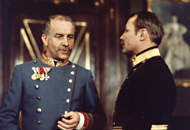Kraus' Thoughts
Although it was evident to many that there was a large change in the culture of Vienna at this time, most people seemed to embrace it without much thought and took this new way of expressing art to extreams (think of the cow creamer and bowl thing in class). Surprisingly there did not seem to be many people who realized what was happening and actively tried to show people how rediculous some of the things they were doing were. Karl Kraus knew that Literature was one of the most important/powerful tools that man has to communicate with each other, so he would spend hours perfecting his writings to get the message that he wanted across. After entering this new era where no matter how bad the writing was, everyone was looked up to because they were expressing themselves. Peter Altenberg's writing discusses that even though the discussed writer has many many shortcommings (I believe one of them was not being able to spell correctly), they still became successful. Kraus looks at all of this and is absolutely appauled, to him, the world has lost it's sense of self and is numb, trying to grasp on to anything that gives it sensation. His moderately lengthy discussion on the coffehouses goes into great detail about all the little problems and how they are really just a reflection on the Viennese culture basically going mad. After reading it, I get the sense that Kraus knew something big was going to happen and either rectify or end this madness sometime soon.



1 comment:
I like how you said that you "get the sense that Kraus knew something big was going to happen...". It really gives us an emotional incite to him rather than just knowing he thought the coffeehouse poets were like blank slates. It makes us see that Kraus is almost overly compassionate about Literature and Language and really did want people to perfect it. I once heard someone say (I think in my high school lit class), "that you could almost say that Kraus believed if you forgot a comma, it was like starting a war". After reading his work "The Demolished Literature", I understand that statement I once heard.
Post a Comment